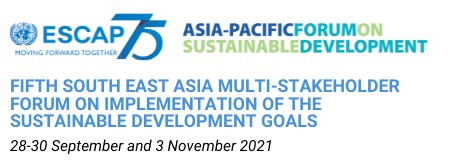Last September 30, the Reality of Aid-Asia Pacific (RoA-AP) was tasked to give a short intervention on behalf of the Asia Pacific Regional CSO Engagement Mechanism (APRCEM) in the Session on Sustainable Finance Recovery of the UNESCAP’s 5th Southeast Asia Multi-Stakeholder Forum. As it is called a multi-stakeholder forum, it aims to provide a space for various development actors from across sectors to share their perspectives in achieving Agenda 2030 in the region. However, participation of civil society in the Multi-Stakeholder Forum remains tokenistic, with no recognition of the role of civil society organizations as development actors in their own right, as well as their contributions in achieving inclusive, sustainable development. The session on sustainable finance recovery showed explicit bias towards the private sector, prioritizing their views over those from the peoples of Southeast Asia, as exemplified in how the intervention of RoA-AP was cut short during the Forum. The whole intervention can be found below.
—
Southeast Asia as a region has been heavily impacted by the pandemic, with high figures of infection, decline in economic growth and reversal of progress towards sustainable development, while also remaining vulnerable to the threats of the climate emergency. In facing the unprecedented Covid-19 pandemic, lingering climate emergency and challenges to sustainable development, countries in the region have mobilized both public and private finance to address these issues. However, the current aid architecture and financing systems have proven to bring more negative impacts than positive ones, which have profound effects on the region’s people and environment.
Green and sustainability bonds are utilized by the private sector as convincing facades to seemingly finance climate and development projects in the region and beyond. In reality, these bonds are actually fostering corporate-led development, implementing false solutions and negatively impacting peoples’ rights and development. Under the guise of development and climate finance, green, social and sustainability bonds serve as repackaged loans to national governments and private corporations, offering no additional financing and promoting debt burden to developing countries in Southeast Asia. Bonds, on top of existing loans, will incur massive amounts of debt, especially for developing countries who already bear the burden of facing compounding development challenges. Instead of investing public money into the provision of much-needed social services to the people, these will be utilized to pay off these debts.
In the region, these bonds pave the way for the entry of more profit-driven projects by International Finance Institutions or IFIs, as these entities play the role of issuer and guarantor. These IFIs have a long track record of promoting corporate-led development, harming peace and security, violating human rights and destroying the environment. Furthermore, as bonds remain reliant on the private sector to be used, climate finance remains out of reach for many countries and development actors. Green and sustainability bonds remain exclusive for large corporations and national governments, leaving climate and development projects pursued by local governments and micro, small and medium enterprises further behind.
Projects financed by these bonds promote false solutions, as these further contribute to the degradation of the environment and violate peoples’ rights. Climate finance from the private sector has been focused on mitigation projects, rather than adaptation projects which the region needs. Green bonds have also been heavily criticized for greenwashing or causing adverse impacts to the environment, with its lack of accountability and transparency mechanisms. With no existing regulatory framework and processes, these bonds hinge on raking in profit rather than meeting the needs of the people and the environment, serving to be ineffective in facing the multiple crises today.
The emphasis on infrastructure in the region, with most of the green bonds directed towards the construction of buildings utilized for commercial use, risks further degradation of the environment, displacement of communities, loss of livelihoods and violation of human rights. The lack of consistency and alignment with national and local development and environmental plans also threaten the sustainability and effectiveness of these projects. While the marginalized and vulnerable sectors of society face the brunt of the climate emergency, they remain excluded from these processes. Projects under green bonds also heavily exclude the participation of civil society organizations, people’s organizations and communities in planning, designing and implementing these projects.
Following the polluter pays principle, historical, and therefore, financial responsibility in addressing the climate crisis should be in the hands of large, multinational corporations and countries of the global North. Therefore, the pursuance of loans and bonds as modalities for climate finance puts the burden on developing countries to finance solutions for the climate emergency they had a small part in causing. Instead of highlighting the role of the private sector in development, public finance must be further mobilized to ensure long-term, sustainable and inclusive development projects for the people. A focus on the most vulnerable sectors such as Indigenous Peoples, farming and coastal communities, workers, fisherfolk, urban poor, rural women and children, among others, must be pursued in these projects. Furthermore, donors, the private sector, national governments and other development actors must uphold the development effectiveness principles of democratic country ownership, focus on results, inclusive partnerships, transparency and accountability. A people-centered and rights-based approach to development and climate finance remains to be the only solution in addressing the compounding development challenges the region and the world faces today.
***
The livestream of the session can be found here.

